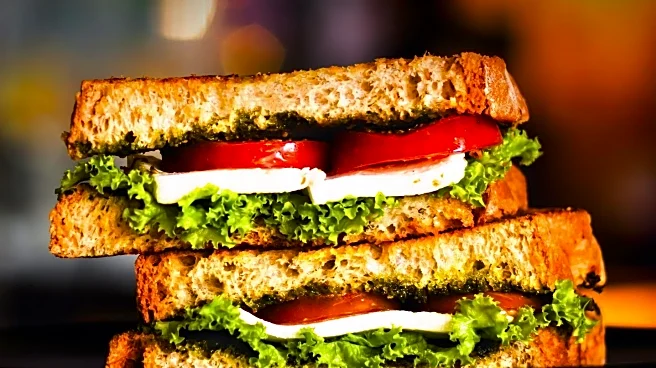What's Happening?
Jimmy John's, a popular sandwich chain, is reintroducing its Picklewich, a unique bread-free sandwich option, for a limited time. The Picklewich replaces the traditional French roll with hollowed-out dill
pickles, offering a low-carb alternative to conventional sandwiches. This product was initially launched in 2024 and gained significant popularity, prompting its return. The Picklewich will be available from October 27 to November 23, or until supplies last, at Jimmy John's locations nationwide. Customers can choose from six filling options: ham, tuna, turkey, veggie, roast beef, and Italian. The launch event, dubbed 'PickleCon,' took place in midtown Manhattan, where attendees sampled the Picklewich in a pickle-themed setting.
Why It's Important?
The introduction of the Picklewich reflects a growing trend towards low-carb and alternative diet options in the fast-food industry. By offering a bread-free sandwich, Jimmy John's caters to consumers seeking healthier or diet-specific choices, such as those following keto or gluten-free diets. This move could potentially attract a broader customer base and increase sales for the chain. Additionally, the Picklewich's return highlights the impact of viral marketing and consumer demand in shaping product offerings. As dietary preferences continue to evolve, fast-food chains may increasingly innovate to meet diverse consumer needs.
What's Next?
As the Picklewich becomes available, consumer response will likely influence its future availability and potential permanent inclusion on the menu. If successful, other fast-food chains might explore similar low-carb alternatives to capitalize on the trend. Additionally, feedback from customers regarding the practicality and taste of the Picklewich could lead to further refinements or new variations. The outcome of this limited-time offering will be closely watched by industry analysts and competitors alike.
Beyond the Headlines
The Picklewich's introduction raises questions about the sustainability and health implications of such innovations. While offering a low-carb option, the high sodium content of pickles could be a concern for some consumers. Moreover, the environmental impact of increased pickle production and waste management from discarded pickle brine may warrant consideration. As food trends continue to evolve, balancing consumer demand with health and environmental considerations will be crucial for the industry.










